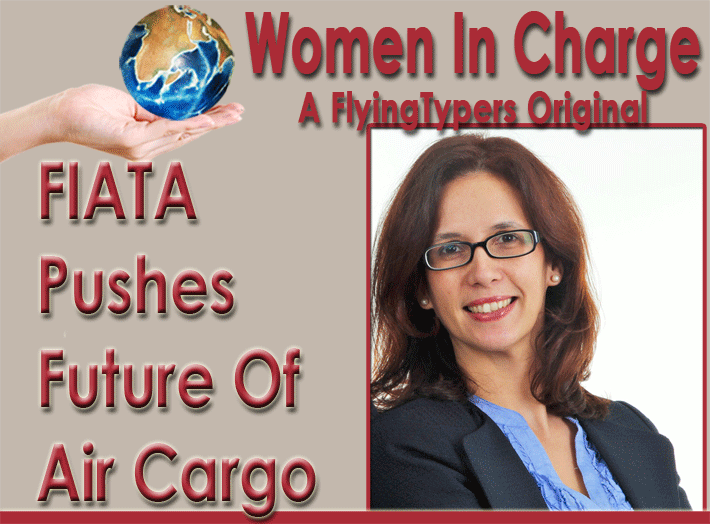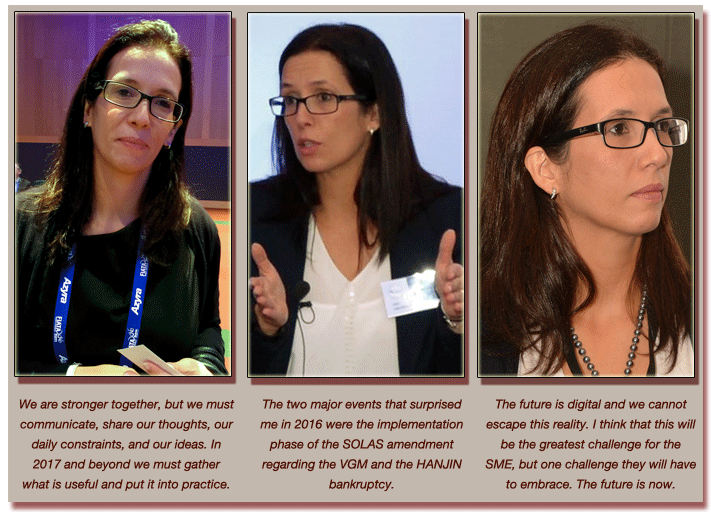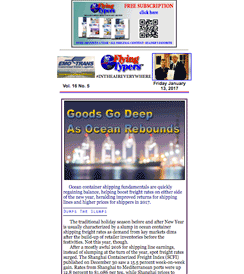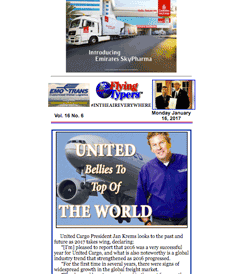
Lofty
goals aside, the promise of cooperation
is solidifying as the IATA FIATA Air Cargo
program (IFACP) announced at the 90th FIATA
Annual Conference in October last year in
Dublin, Ireland, moves into reality.
Although many
people may step back a bit with a weathered
eye and a wait and see attitude, don’t
cast any doubt about moving this program
forward into overdrive because Joana Nunes
Coelho, Executive President of Associação
dos Transitários de Portugal - APAT
(Freight Forwarders Association of Portugal),
doesn’t have time for it.
Smart, beautiful,
and totally dedicated, Joana is on the beam
to take this revolutionary IATA/FIATA agreement,
which reengineers the Cargo Agency Program,
all the way into operation worldwide.
However, she
has no illusions:
“As
IFACP Governance Manager, my top priority
is to ensure the success of the implementation
of the IFACP that will begin in early 2017
with Canada as the pilot country,”
Joana told FlyingTypers in an exclusive
interview.
Portugal
Powerhouse Sees IFACP Challenges
“I have
served as Executive President of APAT, the
Portuguese FIATA member, for 21 months.
“In
the beginning of 2016 I submitted to my
board a project plan for the current year.
“The
document was approved and from the 10 projects
that I planned to develop, only 2 are still
in progress—one for financial reasons
and the other because we have determined,
for strategic reasons, that it should not
go forward.
“Now
I shall have to measure my strength with
FIATA’s portfolio and that is another
ball game. Without
getting out of the airfreight field and
knowing that there is at least three or
four times as much to do in other areas,
we have to implement the new IFACP and that
is a novel agreement that needs to implemented
all over the world, country by country,
replacing habits and mores that lasted for
decades.
“IFACP
is not exactly a piece of cake, and then
there is the e-AWB challenge, and also the
transition period, where many decisions
still have to be taken, cooperating with
airlines that are also looking at a new
chapter and may have precisely the same
uncertainties that we have,” she said.
“But
what is happening is human, it is inevitable,
and from any point of view this cooperation
is all good.”
Biggest
Surprise of 2016?
Casting the net
a bit wider, Joana shares some shock and
awe events of 2016.
“The
two major events that surprised me in 2016
were the implementation phase of the SOLAS
amendment regarding the VGM and the HANJIN
bankruptcy.
“So
much was said and written about the SOLAS
amendment, so much was supposed to have
changed regarding the gross mass verified
and declared by the shippers to the shipping
line, so much has been done by some national
governments in order to adjust their legislation
to the SOLAS requirements, only to discover
that shipping lines accept the VGM with
their internal procedures, period.
“Maybe
‘much ado about nothing,’ as
the Bard wrote, is not completely right,
but we are not far.”
HANJIN
Shocker Still Reverberates
“The
other event that surprised me was the HANJIN
bankruptcy, with the enormous losses it
will bring to freight forwarders, and more
losses yet to come.
“Notwithstanding
what the law may say, in a global world
like the one we have today, it is difficult
to stomach that a shipper has to pay twice
the value of the freight to get cargo to
a safe port, or worse.
“Sadly,
we are still facing insufficient protection
in this area.”
Changing
FIATA Cargo Program 2017
First, a bit
of background.
“Freight
forwarding companies operated within the
IATA Cargo Agents’ rules for several
decades; their services gradually evolved
in time from being ‘selling-agents’
for the airlines’ services to becoming
their purchasing customers.
“IATA
and FIATA have joined forces to review,
refine, and reengineer this Agency Program
to reflect these changes, and the IATA FIATA
Air Cargo Program was adopted.
“The
brand new program moves decision-making
on the rules governing the airline-forwarder
relationship to a governance body jointly
managed by forwarders and airlines, which
reflects today’s market conditions.
“The
current IATA Cargo Agency/Intermediary Programs
will be replaced by the new IATA-FIATA Air
Cargo Program (IFACP) under the governance
of IATA-FIATA Governance Board (IFGB).
“Once
it is implemented, the IATA Cargo Agency/Intermediary
Program Rules will be rescinded.”
Joana was
born in Lisbon in 1980.
She graduated
in 2001 with a degree in Law from the Lisbon
University Faculty of Law.
In 2006 she
continued her post-graduate education in
Maritime Law.
“In
2010, because I was not completely happy
practicing law, I felt the urge to join
a project that would allow me to contribute
more effectively to other people’s
lives.
“So,
with that purpose in mind, I took a Mediation
and Conflict Resolution Course and joined
APAT.
“Since
2010—and still today—my focus
is helping Portuguese freight forwarders
improve and developing their businesses.
“In
this industry, I grow personally and professionally
every day, and therefore I can say I am
a happy person, optimistic about the future,
and resilient, highly-motivated and result-oriented
as a manager.”
 |
Long
Term Goals
“Long
term, I wish to keep contributing the best
way I can to the freight forwarders’
community.
“I want
to get involved in as many initiatives as
possible in order to make the market (import
and exporters around the world) understand
the importance of the freight forwarders,
and the added value of the service they
provide.
“In
Portugal, and I believe in the rest of the
world as well, only those dealing with international
trade on a daily basis understand the meaning
and the concept of a freight forwarder.
“I believe
forwarders need to be more proactive if
we want to become real opinion makers in
the transportation industry.
“Importantly,
we must make the general community and governments
more aware of the importance of logistics,
transports, and international trade as a
whole, precisely as shown in the reference
description of services published on the
FIATA website.
“I am
convinced the new IFACP is a major step
in the direction of better, more informed
logistics choices.”
Recipe
For Better Air & Ocean Business
“Businesses
must adapt to the IT technology and not
just talk about it.
“The
future is digital and we cannot escape this
reality.
“I think
that this will be the greatest challenge
for the SME, but one challenge they will
have to embrace. The future is now.
“I believe
we create the future, but if one wants to
evolve, one must be open minded and embrace
changes as something natural. Digital platforms
and new technologies are here to stay and
they are quickly transforming our services.”
FIATA
Is Simply Outstanding
“I genuinely
believe that FIATA has an outstanding plan
of action. I believe that all the strengths,
weaknesses, opportunities, and threats for
FIATA are identified by the current Board.
“Having
the line of action defined will definitely
allow FIATA to reinforce the importance
it already has in the logistics scenario
of international trade.
“Being
an organization that represents an industry
covering approximately 40,000 forwarding
and logistics firms, the only thing FIATA
could improve, in my opinion, is the process
of developing, orienting, and training to
improve knowledge and motivations in our
sector.
“Perhaps
even more than benefiting from an ongoing
conversation, I believe all industry stakeholders
could benefit from making ideas come true
by deciding swiftly on implementing the
changes that modern traders require. More
visibility and higher frequency in SC information
would be fundamental to supplying continuous
feedback to the shippers.
“Understanding
and effectively explaining to our principals
what the main constraints are in worldwide
trade and what can be done in each country
to locally develop the air cargo industry
will facilitate trade at large,” Joana
declared.
Why
FIATA?
“I am
a member, and an active part of being in
a community is to share experiences, to
learn more and contribute as much and as
effectively as we can.
“We
are stronger together, but we must communicate,
share our thoughts, our daily constraints,
and our ideas.
“In
2017 and beyond we must gather what is useful
and put it into practice. Simply put, the
driving force here is we must never stop
communicating with each other and working
together worldwide toward the benefit of
the freight forwarding community.
“The
mere trove of good practice and sales tools
such as the FIATA Bill of Lading and the
training opportunities are as valuable as
one can make them by exploiting their distribution
in each and every country.
“Of
course, one can rejoice to be chairing a
meeting or meeting colleagues and friends,
but that is for me the bonus track, not
the album,” Joana Nunes Coelho concluded.
Geoffrey




 Vol.
16 No. 5
Vol.
16 No. 5 Vol.
16 No. 6
Vol.
16 No. 6